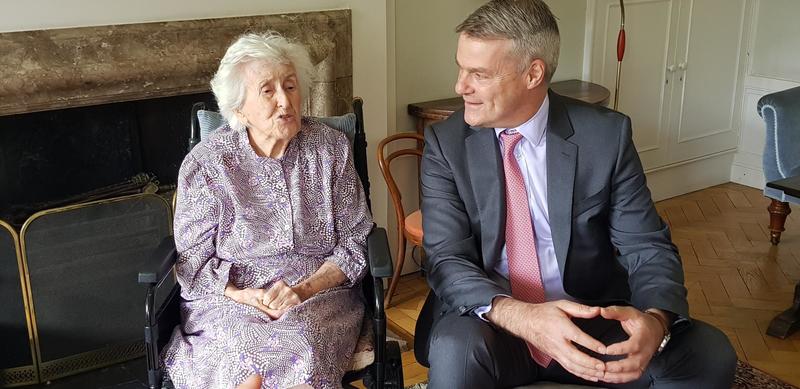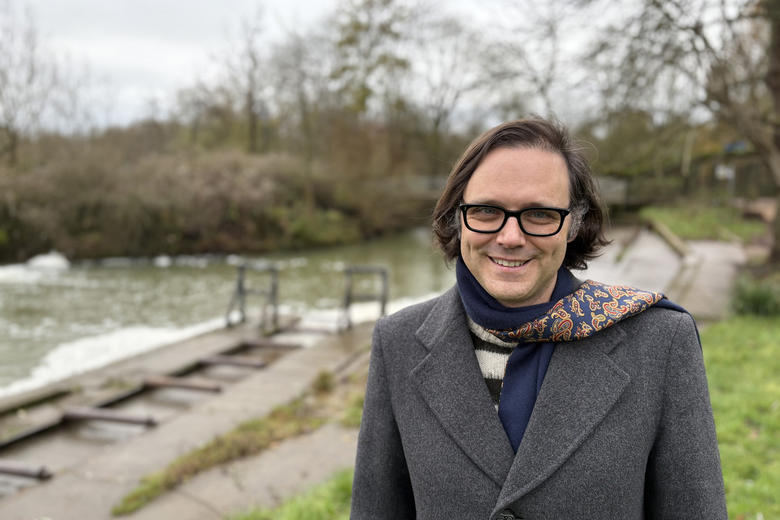BLETCHLEY PARK ALUMNA ELIZABETH KASER

BLETCHLEY PARK ALUMNA ELIZABETH KASER
One of the last living Oxford alumnae of World War Two code breaking efforts visited her college LMH
Published: 24 July, 2023
Author: Richard Lofthouse
Share this article
Lady Margaret Hall recently had the honour of welcoming Elizabeth Kaser (Piggford, 1943, English) along with her daughter and granddaughter for a special visit on 31 May. At the age of 98, Elizabeth is, says the college, ‘to the best of our knowledge LMH's last living Bletchley Park alumna’.
For years, the Official Secrets Act meant that this whole chapter of Oxford’s contribution to the war effort remained a nearly total blank.
In Paul Addison’s chapter about the war in the official history of the University (1994), he makes light of the recruitment of academics to ‘various branches of cloak-and-dagger warfare,’ insisting that intellectuals were ‘a transient minority in the world of secret intelligence’. Just five names are then mentioned – all men.
Yet LMH now knows of 33 women who were recruited, with the then college Principal Lynda Grier asked to cast around for suitable candidates.
One of them was Elizabeth Kaser, who lived in Lodge Building Room 3 while studying English for all of one year before being whisked off to perform a role apparently resting on linguistic skills, later recording and intercepting transmissions.
Women were frequently recruited for their competence in a modern language, often working alongside cryptographers and other codebreakers within teams at Bletchley Park, purchased in 1938 as a war station for the Government Code and Cypher School.
During her visit to LMH, Elizabeth had the opportunity to meet with current college Principal Professor Stephen Blyth, engaging in a lively conversation about her experiences.
Elizabeth recalled the high-powered ‘melee’ of the Oxford atmosphere with numerous important people tending to decamp to Oxford or Cambridge from London, when London was deemed too dangerous because of the threat of bombing.
Previously a student at a convent school in Manchester, Elizabeth was the first pupil from her school to attend Oxford and only the second to attend university. She was a ground breaker in this context saying in a recorded oral history interview that she didn’t set out to ‘deliberately break rules but to make my own decisions…’ Elizabeth joined LMH at a time when it was still rare for women to progress to higher education.
Just one year into her studies, Elizabeth went to work at the Mathematics Institute, where she helped to decode war communications for Bletchley Park. Reflecting on that time, she described it as an exhilarating period in her life. The atmosphere was urgent and intellectually stimulating. The onset of World War II had opened up new opportunities for women.
Having signed the Official Secrets Act, Elizabeth worked in a clandestine role for the Secret Service, listening to and recording classified conversations.
Following the war, Elizabeth worked for the World Health Organization in Geneva before eventually returning to Oxford with her young family.
Of the other known Oxford women who served the country in a secret capacity, one of the most successful was Patricia Brown (Bartley, 1936). A little bit older than Elizabeth by the start of the war, Patricia progressed so rapidly that by January 1942 she was heading the prestigious German Diplomatic Section, with numerous men much her senior in years working under her direction. October of the same year saw a particular breakthrough in deciphering Floradora, as it was light-heartedly referred to internally (after a musical) – a twice encoded German diplomatic code.
There is a list of LMH alumnae who are known to have served during the Second World War, but the matter is less clear for the other women’s colleges, such as St Hugh’s, St Hilda’s, Somerville and St Anne’s.
Certainly there were other Oxford alumnae who served, one of them Janet Ferrier (St Hilda’s, 1937). But the role of Principal Lynda Grier at the time as a recruiter appears to have made Oxford’s first women’s college preeminent in World War Two female recruitment to the intelligence services.
Another famous female British code breaker was Betty Webb, who celebrated her 100th birthday on May 13, 2023, and recently published her account of the matter, No More Secrets: My Part in Codebreaking at Bletchley Park.
In a sentiment that would have been shared by many of her peers including those at Oxford, she said, ‘I wanted to do something more for the war effort than bake sausage rolls.’
Discover the incredible achievements of Britain's World War Two Codebreakers at Bletchley Park















